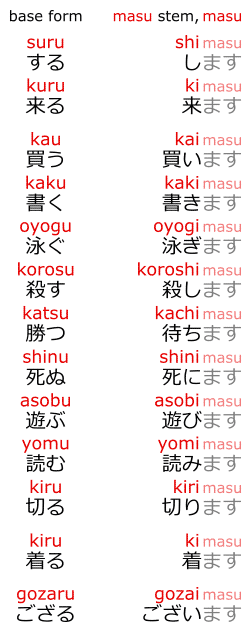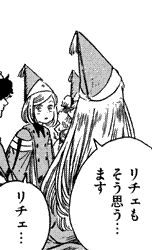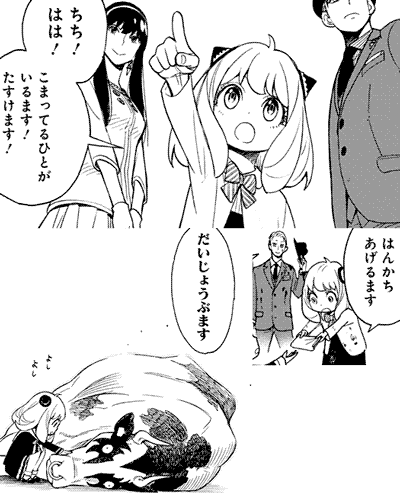In some Japanese textbooks, the term -masu stem (or masu-stem) refers to what you get when you conjugate a verb to its polite form, which ends in ~masu ~ます, and then remove the ~masu suffix, leaving you with the stem of the conjugation. It generally refers to the same thing as the term ren'youkei 連用形. Usually the term "-masu stem" is used when talking about adding a different suffix to the masu-stem (ren'youkei) than ~masu. For example:
| ichidan verb | godan verb | |
|---|---|---|
| Dictionary form | kiru 着る To wear. |
kiru 切る To cut. |
| Polite form | kimasu 着ます |
kirimasu 切ります |
| masu-stem or ren'youkei. |
ki~ 着~ |
kiri~ 切り~ |
| tai-form (masu-stem + ~tai) |
kitai 着たい To want to wear. |
kiritai 切りたい To want to cut. |
This term has the problem that, for some verbs, the stem of masu isn't also the stem of other suffixes, e.g. in osshaimasu おっしゃいます, ossharitai おっしゃりたい, but in most cases it works just fine.
Grammar
See the article about the ren'youkei 連用形 for details about grammar.
See the article about stem if you want to know what the word "stem" in masu-stem is supposed to mean.
vs. Ren'youkei
The ~masu ~ます suffix (jodoushi 助動詞) is suffixed to the ren'youkei, hence the ren'youkei is called the ~masu stem, however, these two terms aren't technically the same. We'll see below why.
Adjectives
Although adjectives have a form called their ren'youkei (e.g. kawaii 可愛い to kawaiku 可愛く), they do not have a masu form, you can't say *kawaiku-masu, so they don't have a masu stem.
Onbinkei
The word shinda 死んだ, "died," is the past form of shinu 死ぬ, "to die." In this word, the ren'youkei shini~ 死に~ is the stem for the past tense jodoushi ~ta ~た. When combined, shini~ and ~ta become shinda 死んだ. You could say shini became shin~ and ~ta became ~da, so shin is considered a ren'youkei and you might find ~ni/~n に/ん as ren'youkei endings in some resources.
Despite this, the masu form is shinimasu 死にます, not *shinmasu 死んます, so shin~ isn't a masu stem, only shini~ is.
The above (~ni to ~n) is called a hatsuonbin 撥音便. The same idea applies to other onbinkei 音便形 like asonda 遊んだ, asobimasu 遊びます, kaita 書いた (i-onbin イ音便), kakimasu 書きます, and so on.
~imasu ~います Endings
Sometimes a word unexpectedly ends in ~imasu ~います because the masu form produces an i-onbin イ音便, even though the past form does not. This occurs with some verbs that end in ~aru ~aる.
For example, the masu form of nasaru なさる is nasaimasu なさいます (i-onbin), while its past form is nasatta なさった (sokuonbin 促音便). Compare to a regular ru-ending godan verb: kiru 切る, kirimasu 切ります (no i-onbin), kitta 切った (sokuonbin).
This i-onbin only affects the masu form conjugation. The tai-form, for example, would be nasaritai なさりたい, with an unchanged nasari~ ren'youkei.
Some other examples:
| Dictionary form | Polite form |
|---|---|
| gozaru ござる |
gozaimasu ございます |
| nasaru なさる |
nasaimasu なさいます |
| ossharu おっしゃる |
osshaimasu おっしゃいます |
| irassharu いらっしゃる |
irasshaimasu いらっしゃいます |
| kudasaru くださる |
kudasaimasu くださいます |
| satsushiyaru さつしやる |
satsushiyaimasu さつしやいます |
In the late Edo period, both gozarimasu and gozaimasu were used, but in modern Japanese the variant without onbin is almost never used, and the i-onbin gozaimasu is the standard.(福島, 2016:181)
With this in mind, if you see a character that says the words above with ~rimasu instead of ~imasu, that could be a hint that they aren't from modern Japan, but from some ancient time period.
Misconjugation
Sometimes anime characters not used to polite speech will misconjugate the polite form by suffixing the ~masu jodoushi directly to the nonpast form of a verb, in which case the masu stem would technically be the nonpast form. Of course, nobody teaching Japanese uses the term "-masu stem" like this. For reference:
- ?ganbarumasu!
がんばるます!
[I'll do my best]!
[I'll work hard]!- Misconjugation of ganbarimasu 頑張ります, created by suffixing ~masu directly to the nonpast form ganbaru 頑張る rather than its ren'youkei ganbari~ 頑張り~.
- Context: Riche, a child character not used to speaking politely, tries to speak politely.
- ?Riche mo sou omou... masu
リチェもそう思う・・・ます
I also think so.- Riche uses her own name as first person pronoun, something children do.
- ?omoumasu is a misconjugation of omoimasu 思います. She uses the plain form omou 思う at first, which is how she would normally speak, but a moment later (indicated by the ellipsis), she realizes her mistake and adds the ~masu she forgot about.
- Riche...
リチェ・・・
In some cases, ~masu is misused where desu です should be used instead.
- Context: Anya アニャ has to speak politely, but conjugating the polite form correctly is too hard for the 4–5 year old girl, so she just ends all her sentences with ~masu.
- chichi! haha!
ちち!はは!
Dad! Mom! - ?{komatteru} hito ga irumasu!
こまってるひとがいるます!
There is someone [who] {is troubled}!
That person over there needs help!- komatteru - contraction of komatte-iru 困っている.
- ?irumasu いるます - wrong.
imasu います - correct.
- tasukemasu!
たすけます!
[We] will help [him]!- This one is correct.
- ?hankachi φ agerumasu
はんかちあげるます
[I] will give [you] a tissue.
Here's a tissue for you.- ?agerumasu あげるます - wrong.
agemasu あげます - correct.
- ?agerumasu あげるます - wrong.
- ?daijoubumasu
だいじょうぶます
[It] is alright.
- ?daijoubumasu 大丈夫ます - wrong. This isn't even a verb.
daijoubu desu 大丈夫です - correct.
- ?daijoubumasu 大丈夫ます - wrong. This isn't even a verb.
- yoshi yoshi
よしよし
[There there].



No comments: